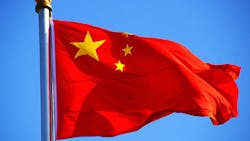China Reveals Specifics on First Free Trade Zone in Shanghai
SHANGHAI - China has officially unveiled details of its first free trade zone (FTZ) in Shanghai, shedding light Friday on the reform path of the new leadership as it aims to transform the world's second-largest economy.
The FTZ project, which received government approval last month, will be inaugurated on Sunday, the official Xinhua news agency reported this week.
The government will allow free yuan convertibility under the capital account on a trial basis, and test market-set interest rates and cross-border use of yuan in the zone, according to a release by the State Council, China's cabinet.
Restrictions on foreign investment will also be eased, as regulations on operations of foreign firms and Sino-foreign joint ventures will be "temporarily adjusted" in the zone for three years from Oct. 1, according to the details, which are largely in line with a draft plan seen by AFP earlier this month.
Economists said the contents released Friday indicated that China will accelerate its capital account convertibility and financial-sector reforms, but its ability to manage capital flows will also be tested.
"It is politically wise to conduct a pilot in a small and restricted area as the Chinese authorities intend to contain potential risks," ANZ bank economists wrote in a research note on Friday.
"We view the ability to control capital flows as the biggest challenge for the FTZ," the economists said, adding onshore and offshore interest rate differentials will spur capital inflows.
The free trade zone will amalgamate four existing bonded trade zones in Shanghai -- China's commercial hub -- and span almost 29 square kilometers (11 square miles), according to Xinhua.
The zone is part of structural reforms that authorities have pledged to push forward to shift the economy away from dependence on big-ticket investments and more towards consumer demand as the key growth engine.
China's economy, the world's second largest, expanded 7.7% in 2012, its slowest pace in 13 years. Growth stood at 7.7% in the first three months of this year and slowed further to 7.5% in the April-June period.
"It [the zone] should be made an experimental field to push forward reforms, improve the open economy, as well as accumulate experience that can be duplicated and promoted," the State Council said.
No Mention of Internet Liberalization
However, the announcement made no mention of a reported plan to liberalize the country's tightly controlled Internet sector in the zone.
Earlier this week, unnamed government sources said the zone will allow access to Facebook, Twitter and other websites banned nationwide, the South China Morning Post had reported.
The official People's Daily later rebuffed the report, saying in a Friday commentary that "China will not set up a 'political concession' on the Internet."
According to the State Council, China will also ease restrictions on trade as well as 18 service sectors ranging from finance and shipping to culture services.
Foreign financial institutions will be allowed to set up solely owned banks and privately funded Sino-foreign joint ventures, while domestic lenders will able to conduct offshore business in the zone.
A proposal to allow foreign and Sino-foreign joint venture auction firms to sell cultural relics in the area was scrapped in the details announced Friday, though it was included in the draft plan.
Premier Li Keqiang, who took office in March, hopes the project will be one of the crowning achievements of his administration, analysts and government officials have said.
Copyright Agence France-Presse, 2013
About the Author
Agence France-Presse
Copyright Agence France-Presse, 2002-2025. AFP text, photos, graphics and logos shall not be reproduced, published, broadcast, rewritten for broadcast or publication or redistributed directly or indirectly in any medium. AFP shall not be held liable for any delays, inaccuracies, errors or omissions in any AFP content, or for any actions taken in consequence.
